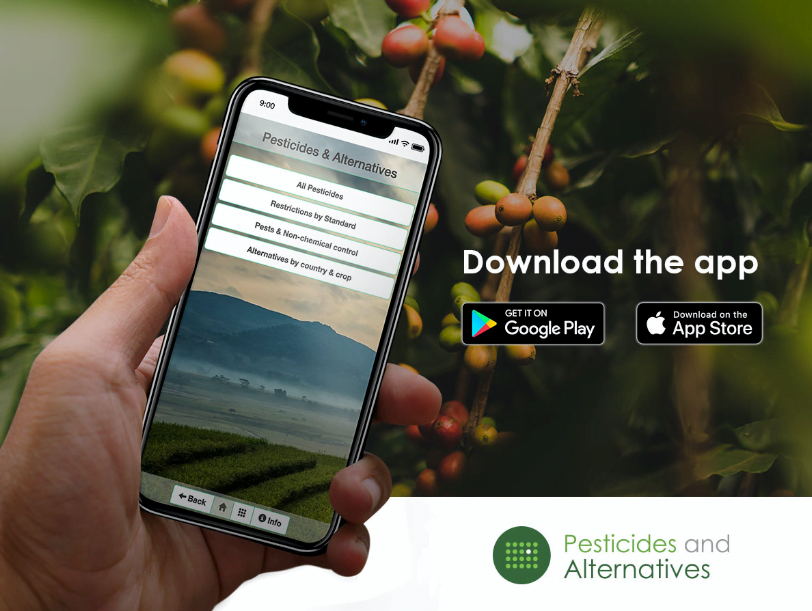Today, a coalition of nine sustainability initiatives and standards launched a new “Pesticides and Alternatives’ app, specially designed to reduce the use of highly toxic pesticides in agriculture.
The Integrated Pest Management (IPM) Coalition believe that reducing the use of highly toxic pesticides and offering relevant information about non-chemical pest control alternatives is critical in a world where around two million tonnes of pesticides are consumed every year1and inappropriate or improper use can affect human health, contaminate water sources, food crops and the environment more broadly.
The new app combines technology and scientific knowledge to create an effective and easy-to-use tool for auditors and decision-makers managing farms, fields and forest plantations. The app is available to download via Google Play or iTunes and contains:
- Access to toxicity information from government authorities, international agreements and/or academic institutions;
- The restriction status for major standard systems (including the Better Cotton Principles and Criteria3) covering more than 700 pesticide active ingredients;
- Toxicity information related to all registered pesticides for crop and pest species in Mexico and India, as well as those registered for crops in Brazil, Colombia and Kenya;
- Non-chemical pest control alternatives for 2,700 pests and diseases, developed by CABI2; and
- A multi-lingual user interface available in English, Spanish and Portuguese.
The development of the app was possible thanks to the ISEAL Innovations Fund, the scientific support of the Oregon State University’s Integrated Plant Protection Center (OSU-IPPC), data facilitation from CABI and the collaboration of the IPM Coalition members: Better Cotton Initiative, Bonsucro, Fairtrade, Forest Stewardship Council, GEO Foundation, Global Coffee Platform, Rainforest Alliance, Roundtable on Sustainable Biomaterials, and the Sustainable Agriculture Network.
IPM Coalition members work together towards the common goal of improving knowledge and sustainable use of agrochemicals, including reducing or eliminating highly hazardous pesticides. The app has been launched to make the pesticide information on the Coalition’s online database more widely available for the countries covered.
Find out more about the “Pesticides and Alternatives’ app (video) and the IPM Coalition.
This project was possible thanks to a grant from the ISEAL Innovations Fund, which is supported by the Swiss Government’s Federal Department of Economic Affairs, Education and Research (EAER).


Notes
1.https://onlinelibrary.wiley.com/doi/full/10.1002/fes3.108 / http://www.ecotippingpoints.org/video/india/etp-pesticide.pdf
2.CABIis a not-for-profit scientific research, publishing and international development organisation. It is also one of BCI’s long-standing Implementing Partners.
3.One of theBetter Cotton Principlesfocuses on reducing the harmful impact of crop protection practices. In 2018, the Better Cotton Initiative increased its emphasis on environmental principles to strengthen the Better Cotton Standard. Our reinforced approach towards pesticide use and restriction includes phasing out highly hazardous pesticides and banning pesticides listed in the Rotterdam Convention (a treaty to promote shared responsibilities in relation to importation of hazardous chemicals).







































